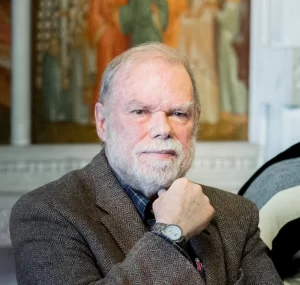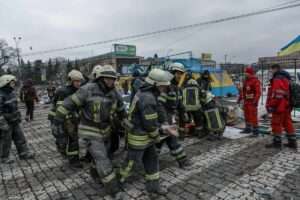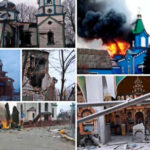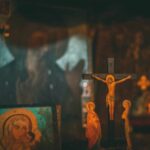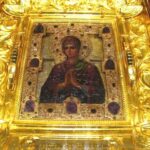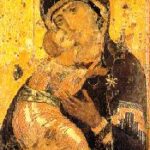Prayer for Peace in the Liturgy
extracts from the writings of Archimandrite Lev Gillet, most of whose books were published anonymously as "A Monk of the Eastern Church"
The Great Litany by which the Divine Liturgy begins opens with a fervent request that peace be granted to us.
This request is so important and so basic that it recurs three times in slightly different forms. These are not superfluous repetitions, for each of these petitions is filled with a deep and special meaning.
"In peace let us pray to the Lord!" This means first of all that we are called to assume a state of inner peace. Those who will take part in the Divine Liturgy should rid their minds of all confusion, all susceptibility to fleshly and earthly temptations, all obsession with "worldly cares," all hostile feelings towards any other person, and all personal anxiety. They should come before God in a state of inner calmness, trusting attentiveness, and single-minded concentration on "the one thing needful." (Luke 10:42)
Then at once there is a second request: "For the peace from above and the salvation of our souls, let us pray to the Lord!'' The peace which we have already requested is something other than a state of mind or a psychological condition produced by our own effort. It is the peace which comes "from above.'' We should humbly recognize that such peace is a gift from God, and we should open ourselves to this gift, stretching out our hands to receive it. On the other hand, we recognize that the divine peace and the "salvation'' of our souls are intimately related. Peace is a sign of the presence and the work of the Savior within us.
Then comes a third request for peace: "For the peace of the whole world, for the welfare of the holy Churches of God and for the union of all, let us pray to the Lord!'' The peace which we request goes beyond our isolated persons and acquires a practical aspect. We pray for the peace of the universe, not only for mankind, but for every creature, for animals and plants, for the stars and all of nature. Thereby we enter into a cosmic piety, we find ourselves in harmony with everything God has called into being. We pray for every disciple of Christ, in order that through each one God might be worshiped "in Spirit and in Truth.'' We pray for an end to warfare and to struggles between races, nations and social classes.
We pray that all of humanity might be united in a common love.
Every temple of the Lord is a house of divine Presence and a house of prayer. Every temple is also a house of peace. May the soul of all those who enter into this holy temple to take part in the assembly of God, become itself a house of peace.
-- from Serve the Lord with Gladness, Saint Vladimir's Seminary Press, 1990
Loving one's Enemies
"Be ye therefore merciful as your Father also is merciful."
(Luke 6:36)
Here, we are very far from a trite moral injunction such as: love other people without hoping for reward. For this phrase confronts us with all that is absolute and -- though one hesitates to say so -- inaccessible in the Christian duty to love. To be merciful as the Father is merciful does not mean that our mercy could ever reach to the infinity of divine mercy; but, that in our own small measure, we should be inspired by the same feelings as the Father; it is from the ocean of the Father's mercy that the minute drops of water which are our acts of mercy must come, and it is into this ocean that they must finally flow. We are not able to perform the merciful acts of the Father, but we can share in his spirit of mercy.
A first sign of this spirit is never to think of a man as utterly lost. "Love ye your enemies...hoping for nothing again," today's gospel tells us. This is not a humanitarian and superficial optimism: after all, a man is never entirely bad; he can change. And another thought can inspire our attitude: if God never ceases to do good to a sinner, if he is always ready to open his arms to him, who am I to dare to be stricter than God? Even in the greatest sinner, the most hardened criminal, the "image of God" is still present. What is important is to know how the "image of God" in me can meet the "image of God" in my enemy -- or in a wrong-doer.
-- on the Gospel of the 19th Sunday after Pentecost; from The Year of Grace of the Lord, p. 19; Saint Vladimir's Seminary Press, Crestwood, NY
the Blood of Christ
The piercing of Jesus's side by the lance and the blood and water that gushed forth have great symbolic and mystical importance. In the Byzantine rite, the priest commemorates this fact through words and by a special action during the proskomedia (the preparation of the Eucharistic gifts).
The Latin devotion to the Sacred Heart has its origins in this episode of the Gospel. Certain representatives of Protestant piety have used (and perhaps abused) the term "the Blood of Christ" so much that many modern Christians prefer to avoid this expression altogether, perhaps from a certain modesty, but also, we fear, because the meaning of the Precious Blood is perhaps no longer felt by them with intensity.
The blood of Jesus, which was shed for us, never ceases to flow, in the sense that at each moment the grace he acquired is communicated to various men, under different conditions. Somewhere on earth, every minute, a child is baptized, a heart repents, or the Lord's Supper is celebrated, and, under these varying forms, salvation is conveyed through the blood of Christ.
The shedding of this blood gives the history of the world its true meaning, for the divine history of the world is the history of the Precious Blood. It is this which matters supremely. The most noble painting of the Flemish school, the masterpiece of the van Eycks -- which shows the universe gathered round the divine Lamb, whose blood is flowing -- gives striking expression to the meaning of all existence. "Who is this that cometh from Edom with dyed garments from Bozrah?....Wherefore art thou red in thine apparel...?" (Isa. 63.1-2)
The victorious hero of whom the prophet speaks was red with the blood of his enemies; but the wine that Christ, represented by this hero, extracts from the winepress and which stained his garments, is the Redeemers's blood itself: "I have trodden the winepress alone; and of the people there was none with me" (Isa. 63. 8) Certainly, the victorious Christ seated at the right hand of the Father, transfigured and raised from the dead, is clothed in a garment of a white more dazzling than snow, and similarly, the righteous who are glorified "have washed their robes, and made them white in the blood of the Lamb." (Rev 7. 14) The world, however, does not yet have access to the Easter...
-- from The Year of Grace of the Lord, footnote 68 from the section on Passion Week, pp 173-4; Saint Vladimir's Seminary Press, Crestwood, NY

